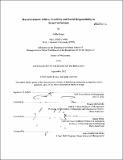| dc.contributor.advisor | Wanda Orlikowski and Susan Silbey. | en_US |
| dc.contributor.author | Evans, Joëlle | en_US |
| dc.contributor.other | Sloan School of Management. | en_US |
| dc.date.accessioned | 2013-03-13T15:51:03Z | |
| dc.date.available | 2013-03-13T15:51:03Z | |
| dc.date.copyright | 2012 | en_US |
| dc.date.issued | 2012 | en_US |
| dc.identifier.uri | http://hdl.handle.net/1721.1/77820 | |
| dc.description | Thesis (Ph. D.)--Massachusetts Institute of Technology, Sloan School of Management, 2012. | en_US |
| dc.description | Cataloged from PDF version of thesis. | en_US |
| dc.description | Includes bibliographical references (p. 237-250). | en_US |
| dc.description.abstract | Competing moral orders pervade markets and organizations. Previous studies of morals and markets show that organizational and occupational communities in contested areas promote one unique moral perspective in order to gain legitimacy and ensure organizational survival. In this perspective, change and innovation are only possible when distinct actors with a competing moral perspective enter a market. Yet communities do sometimes produce innovations at odds with the moral position they promote. How do they achieve this? Drawing on a 17-months ethnography of a stem cell laboratory, I explore the ways in which competing moral orders intersect in the workplace and how this collision shapes work and innovation practices. I examine two distinct moral conflicts: conflicts over safety and conflicts over bioethics. These two different types of conflicts suggest together that, far from being ethical deserts where workers conform to their organization's perspective, workplaces dealing with contested objects and technologies are spaces of intense ethical questioning and negotiation. Local moral contests are rich with creative opportunities: organizational actors innovate and shape their organizations as they seek to couple the practices and goals of their organization with their avowed personal values. This dissertation contributes to unpacking the links between morals and organizations by showing that moral legitimacy is not just a post-hoc justification of organizational products or practices but is integral to the constitution of these products and practices. This work also contributes to studies of expert work by highlighting the role of moral heterogeneity, local contests, authority over tasks, and technological innovation on the definition of social responsibility in expert communities. | en_US |
| dc.description.statementofresponsibility | by Joëlle Evans. | en_US |
| dc.format.extent | 250 p. | en_US |
| dc.language.iso | eng | en_US |
| dc.publisher | Massachusetts Institute of Technology | en_US |
| dc.rights | M.I.T. theses are protected by
copyright. They may be viewed from this source for any purpose, but
reproduction or distribution in any format is prohibited without written
permission. See provided URL for inquiries about permission. | en_US |
| dc.rights.uri | http://dspace.mit.edu/handle/1721.1/7582 | en_US |
| dc.subject | Sloan School of Management. | en_US |
| dc.title | Moral frictions : ethics, creativity and social responsibility in stem cell science | en_US |
| dc.title.alternative | Ethics, creativity and social responsibility in stem cell science | en_US |
| dc.type | Thesis | en_US |
| dc.description.degree | Ph.D. | en_US |
| dc.contributor.department | Sloan School of Management | |
| dc.identifier.oclc | 828429448 | en_US |
